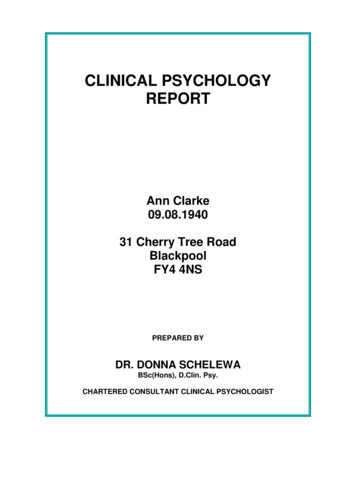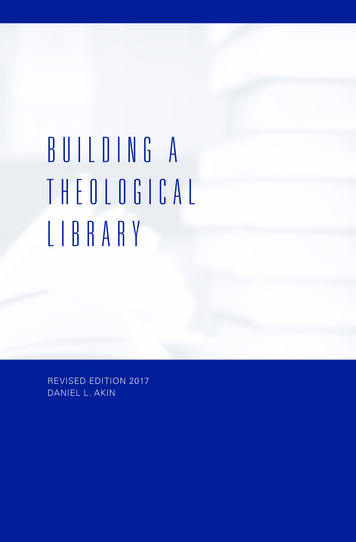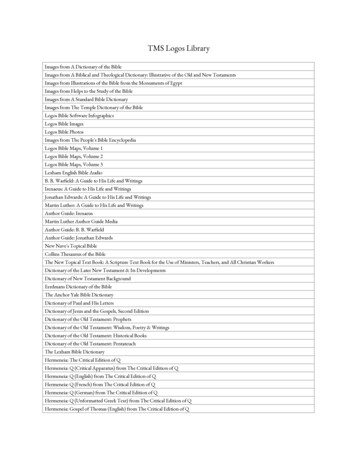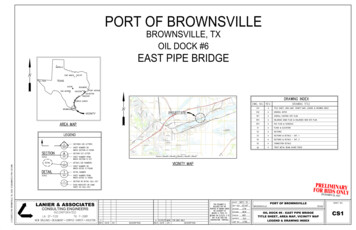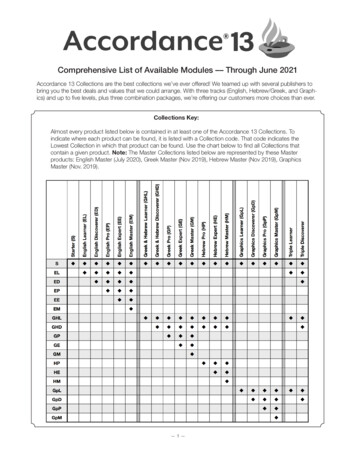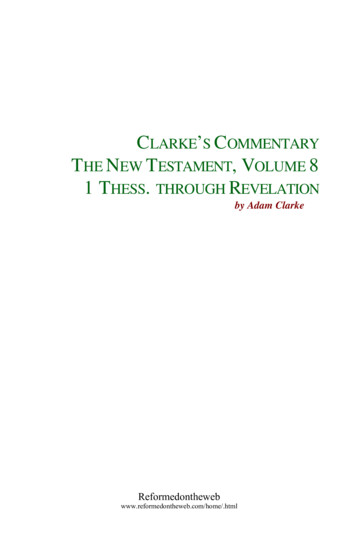
Transcription
CLARKE’S COMMENTARYTHE NEW TESTAMENT, VOLUME 81 THESS. THROUGH REVELATIONby Adam e/.html
2THE NEW TESTAMENTOF OURLORD AND SAVIOR JESUS CHRISTTHE TEXTCAREFULLY PRINTED FROM THE MOST CORRECT COPIES OF THE PRESENTAUTHORIZED TRANSLATION,WITHA COMMENTARY AND CRITICAL NOTES;DESIGNED AS A HELP TO A BETTERUNDERSTANDING OF THE SACRED WRITINGSBY ADAM CLARKE,LL.D., F.S.A., etcFOR WHATSOEVER THINGS WERE WRITTEN AFORETIME FOR OURLEARNIONG; THAT WE, THROUGH PATIENCE AND COMFORT OF THESCRIPTURES, MIGHT HAVE HOPE. — ROMANS 15:4VOLUME VI(B) THESSALONIANS TO THE REVALATION.
3EDITOR’S NOTESPreparing Clarke’s Commentary on the Old and New Testaments for anelectronic format has been a task of considerable dimensions. The DigitalLibrary edition is the labor of love of Sulu Kelley of Concord, NC, USA.“Mr. Sulu” converted the original text from the six volume edition(originally published in 8 volumes) authored by Adam Clarke between1810 and 1826. We thank Mr. Kelley for giving us permission to includethis the first electronic edition of a most helpful and inspiring work.The reader is advised to note the following characteristics of this version:1. There are no Hebrew vowel pointings nor are there any Greekaccents. These were not a part of the published editions of Clarke’sCommentary.2. Most capitalizations and many breathing marks were omitted fromthe Greek text.3. Adam Clarke had an exceptional knowledge of Biblical languages andthe languages of the earliest (known) Biblical texts. The authorprovides numerous references to versions in various languages whichcontain nuances and/or insight into the meaning of a given text. Thesereferences frequently contained phrases printed in Arabic andAnglo-Saxon among others. We anticipated few of the Libraryreaders would have an appreciation for these references, particularlysince the script and dialects of many of them were outside the scopeof almost anyone’s experience or education. Since these referencesare usually transliterated and/or explained by Mr. Clarke, we haveomitted these scripts. We have observed the following abbreviationconventions when the associated language/script has been removedfrom the text: [AS] Anglo-Saxon; [A] Arabic, Arabian; [P], Persic,Persian; [S] Syriac, Syrian; [H] Hindu.4. The printed version contains material not included in this electronicversion: The King James text, from which the author worked, andassociated cross references are omitted as each phrase discussed isquoted in the analysis itself. Several tables with obscure material are
4omitted as it was felt that archaic data on, for example, the motion ofthe planets, information long since revised and corrected, would notenhance and may even obscure the timeless portions of thecommentary.5. The printed version contains a number of archaic forms ofpunctuation and capitalization. These were retained if they did notseem to obscure the meaning of the text.
5PREFACETO THEFIRST EPISTLE OF PAUL THE APOSTLETO THETHESSALONIANST HESSALONICA, now called by the Turks Salonichi, a mere corruption ofits ancient name, is a seaport town of Turkey in Europe, situated on whatwas called the Thermaic Gulf, and was anciently the capital of Macedonia.According to Stephanus Byzantinus, it was embellished and enlarged byPhilip, king of Macedon, father of Alexander the Great, who called itThessalonica, or the Victory of Thessalia, on account of the victory heobtained there over the Thessalians; prior to which it was called Thermae.Strabo, Tzeizes, and Zonaras say that it obtained the name ofThessalonica from Thessalonica, wife of Cassander, and daughter ofPhilip.In 1431, it was taken from the Venetians by the Turks, in whosepossession it still continues. It is still a large, rich, and populous city,being ten miles in circumference, and carrying on an extensive trade in silk,the principal merchants being Greek Christians and Jews.Christianity has never been extinct in Thessalonica since the year 51 or 52,in which it was planted there by the Apostle Paul; see Acts 17, etc. Itcontains at present thirty churches belonging to the Greek Christians, andas many Jewish synagogues, besides some Mohammedan mosques.Thessalonica is the see of an archbishop; and is well fortified, beingsurrounded with walls flanked with towers, and defended on the land sideby a citadel; and near the harbor, with three forts.
6St. Paul, in company with Silas, first preached the Gospel in this city andthe adjacent country, about A. D. 52 or 53. Though the Jews, who weresojourners in this city, rejected the Gospel in general, yet a great multitudeof the devout Greeks, i.e., such as were proselytes to Judaism, or thedescendants of Jewish parents, born and naturalized in Greece, believedand associated with Paul and Silas, and not a few of the chief women ofthe city embraced the Christian faith. 441704 Acts 17:4.As the Jews found that, according to the doctrine of the Gospel, theGentiles were called to enjoy the same privileges with themselves, withoutbeing obliged to submit to circumcision and other ordinances of the law,they persecuted that Gospel, and those who proclaimed it; for, movedwith indignation, they employed certain lewd fellows of the baser sort —the beasts of the people, set the city on an uproar, assaulted the house ofJason, where the apostles lodged, dragged him and certain brethren beforethe rulers, and charged them with seditious designs and treason against theRoman emperor! The apostles escaped, and got to Berea, where theybegan anew their important evangelical labors: thither the Jews ofThessalonica, pursuing them, raised a fresh tumult; so that the apostle,being counselled by the brethren, made his escape to Athens; 441705 Acts17:5-15. Thus he followed the command of his Master: Being persecutedin one city, he fled to another; not to hide himself, but to proclaim, inevery place, the saving truths of the Gospel of Christ.It does not appear that St. Paul stayed long at Athens; he soon wentthence to Corinth, where Timothy and Silas were, but probably not beforeTimothy met him, for whom he had sent, 441715 Acts 17:15, to come to himspeedily; and whom, it appears, he sent immediately back to Thessalonica,to establish the believers there, and comfort them concerning the faith; 520302 1Thessalonians 3:2. While Paul abode at Corinth, Timothy and Silas cameto him from Thessalonica, and hearing by them of the steadfastness of theThessalonian converts in the faith of Christ, he wrote this epistle, andshortly after the second, to comfort and encourage them; to give themfarther instructions in the doctrines of Christianity, and to rectify somemistaken views, relative to the day of judgment, which had beenpropagated amongst them. See the preface to the second epistle.
7Who the persons were who formed the apostolic Church at Thessalonicais not easy to determine. They were not Jews, for these in generalpersecuted the apostle and the Gospel in this place. We are therefore leftto infer that the Church was formed,1st, of Jewish proselytes, called, 441704 Acts 17:4, devout Greeks. And2dly, of converts from heathenism; for, on the preaching of the Gospelto them, it is said; 520109 1 Thessalonians 1:9, that they turned to Godfrom idols, to serve the living and true God. Though some of the Jewsbelieved on the preaching of Paul and Silas, 441703 Acts 17:3, 4, yet it isevident that the great bulk of the Church was composed of Grecianproselytes and converts from heathenism. Hence we find in this epistlebut few allusions to the Jews, and but few references to thepeculiarities of their religious or civil institutions.There is a remarkable reading in the text of 441704 Acts 17:4, which I neglectedto quote in the note on that place: instead of twn sebomenwn, ellhnwnpolu plhqov, of devout Greeks a great multitude; the CodexAlexandrinus, Codex Bezae, both in the Greek and Latin, two others, withthe Vulgate, read twn sebomenwn kai ellhnwn, of the devout, i.e.,those who worshipped the true God; AND of the Greeks, i.e., those whowere previously heathens, a great multitude; so that,1. Some few Jews;2. A great number of those who acknowledged the true God; and3. A great multitude of heathens, besides many of the chief women,received the doctrine preached by the apostle, and became members ofthe Church at Thessalonica. See Dr. Paley’s remarks on this variousreading.The First Epistle to the Thessalonians is allowed on all hands to be thefirst epistle that St. Paul wrote to any of the Churches of God; and from ittwo things may be particularly noted:1. That the apostle was full of the Spirit of love;2. That the Church at Thessalonica was pure, upright, and faithful, aswe scarcely find any reprehension in the whole epistle: the
8Thessalonian converts had FAITH that worked, a LOVE that labored,and a HOPE which induced them to bear afflictions patiently and waitfor the coming of the Lord Jesus Christ.This epistle has been divided into different parts by commentators; butthese are arbitrary, the apostle having made no division of this kind; for,although he treats of several subjects, yet he has not so distinguished themfrom each other as to show that he had any formal division in his mind. Inthe divisions imposed on this epistle by commentators we do not find twoof them alike; a full proof that the apostle has made no divisions, elsesome of these learned men would have certainly found them out. Technicaldistinctions of this nature are of little use to a proper understanding of thecontents of this epistle.
9THEFIRST EPISTLE OF PAUL THE APOSTLETO THETHESSALONIANSChronological Notes relative to this Epistle.— Year of the Constantinopolitan era of the world, or that used bythe Byzantine historians, 5560. — Year of the Alexandrian era ofthe world, 5554. — Year of the Antiochian era of the world, 5544.— Year of the Julian period, 4762. — Year of the world, accordingto Archbishop Usher, 4056. — Year of the world, according toEusebius, in his Chronicon, 4280. — Year of the minor Jewish eraof the world, or that in common use, 3812. — Year of the GreaterRabbinical era of the world, 4411. — Year from the Flood,according to Archbishop Usher, and the English Bible, 2400. —Year of the Cali yuga, or Indian era of the Deluge, 3154. — Year ofthe era of Iphitus, or since the first commencement of the Olympicgames, 992. — Year of the era of Nabonassar, king of Babylon,799. — Year of the CCVIIth Olympiad, 4. — Year from thebuilding of Rome, according to Fabius Pictor, 799. — Year fromthe building of Rome, according to Frontinus, 803. — Year fromthe building of Rome, according to the Fasti Capitolini, 804. —Year from the building of Rome, according to Varro, which wasthat most generally used, 805. — Year of the era of the Seleucidae,364. — Year of the Caesarean era of Antioch, 100. — Year of theJulian era, 97. — Year of the Spanish era, 90. — Year from thebirth of Jesus Christ according to Archbishop Usher, 56. — Yearof the vulgar era of Christ’s nativity, 52. — Year of VentidiusCumanus, governor of the Jews, 4. — Year of Vologesus, king ofthe Parthians, 3. — Year of Caius Numidius Quadratus, governorof Syria, 2. — Year of Ananias, high priest of the Jews, 8. — Year
10of the Dionysian period, or Easter Cycle, 53. — Year of theGrecian Cycle of nineteen years, or Common Golden Number, 15;or the first after the fifth embolismic. — Year of the Jewish Cycleof nineteen years, 12, or the first after the fourth embolismic. —Year of the Solar Cycle, 5. — Dominical Letters, it being Bissextile,or Leap Year, BA. — Day of the Jewish Passover, according to theRoman computation of time, the Calends of April, i.e. April 1st,which happened in this year on the Jewish Sabbath. — EasterSunday, April 2. — Epact, or the moon’s age on the 22d of March,or the Xth of the Calends of April, 4 -Epact, according to thepresent mode of computation, or the moon’s age on New Year’sday, or the Calends of January, 11. — Monthly Epacts, or themoon’s age on the Calends of each month respectively, (beginningwith January,) 11, 13, 12, 14, 15, 16, 17, 18, 18, 20, 20. —Number of Direction, or the number of days from the twenty-firstof March (or the XIth of the Calends of April) to the JewishPassover, 10. — Year of Claudius Caesar, the fifth emperor of theRomans, 12. — Roman Consuls, Publius Cornelius Sylla Faustus,and Lucius Salvius, Otho Titianus; and for the following year,(which is by some supposed to be the date of this epistle,)Decimus Junius Silanus, and Quintus Haterius Antoninus.
11CHAPTER 1The inscription by Paul, Silvanus, and Timotheus, to the Church of theThessalonians, 1. St. Paul gives thanks to God for their good estate, andprays for their continuance in the faith, 2-4. Shows how the Gospel came tothem, and the blessed effects it produced in their life and conversation, 5-7,How it became published from them through Macedonia and Achaia, andhow their faith was everywhere celebrated, 8. He shows farther, that theThessalonians had turned from idolatry, become worshippers of the trueGod, and were waiting for the revelation of Christ, 9, 10.NOTES ON CHAP. 1.Verse 1. Paul, and: Silvanus, and Timotheus— Though St. Paul himselfdictated this letter, yet he joins the names of Silas and Timothy, becausethey had been with him at Thessalonica, and were well known there. See 441704 Acts 17:4, 14.And Silvanus— This was certainly the same as Silas, who was St. Paul’scompanion in all his journeys through Asia Minor and Greece; see 441522 Acts15:22; 441619 16:19; 441704 17:4, 10. Him and Timothy, the apostle took with himinto Macedonia, and they continued at Berea when the apostle went fromthence to Athens; from this place St. Paul sent for them to come to himspeedily, and, though it is not said that they came while he was at Athens,yet it is most probable that they did; after which, having sent them toThessalonica, he proceeded to Corinth, where they afterwards rejoinedhim, and from whence he wrote this epistle. See the preface.Verse 2. We give thanks— See 500103 Philippians 1:3, 4, and 510103 Colossians1:3; where the same forms of speech are used.Verse 3. Your work of faith— This verse contains a very high character ofthe believers at Thessalonica. They had FAITH , not speculative andindolent, but true, sound, and operative; their faith worked. They hadLOVE , not that gazed at and became enamoured of the perfections of God,but such a love as labored with faith to fulfill the whole will of God. Faithworked; but love, because it can do more, did more, and therefore labored
12— worked energetically, to promote the glory of God and the salvation ofmen. They had H OPE ; not an idle, cold, heartless expectation of futuregood, from which they felt no excitement, and for which they could giveno reason, but such a hope as produced a satisfying expectation of a futurelife and state of blessedness, the reality of which faith had descried, andlove anticipated; a hope, not hasty and impatient to get out of the trials oflife and possess the heavenly inheritance, but one that was as willing toendure hardships as to enjoy glory itself, when God might be mosthonored by this patient endurance. FAITH worked, LOVE labored, andHOPE endured patiently.It is not a mark of much grace to be longing to get to heaven because of thetroubles and difficulties of the present life; they who love Christ are everwilling to suffer with him; and he may be as much glorified by patientsuffering, as by the most active faith or laborious love. There are times inwhich, through affliction or other hinderances, we cannot do the will ofGod, but we can suffer it; and in such cases he seeks a heart that bearssubmissively, suffers patiently, and endures, as seeing him who isinvisible, without repining or murmuring. This is as full a proof ofChristian perfection as the most intense and ardent love. Meekness,gentleness, and long-suffering, are in our present state of more use toourselves and others, and of more consequence in the sight of God, than allthe ecstasies of the spirits of just men made perfect, and than all theraptures of an archangel. That Church or Christian society, the members ofwhich manifest the work of faith, labor of love, and patience of hope, ismost nearly allied to heaven, and is on the suburbs of glory.Verse 4. Knowing your election of God.— Being assured, from thedoctrine which I have delivered to you, and which God has confirmed byvarious miracles, and gifts of the Holy Spirit, that he has chosen and calledthe Gentiles to the same privileges to which he chose and called the Jews;and that, as they have rejected the offers of the Gospel, God has nowelected the Gentiles in their stead. This is the election which theThessalonians knew; and of which the apostle treats at large in his Epistleto the Romans, and also in his Epistles to the Galatians and Ephesians. Noirrespective, unconditional, eternal, and personal election to everlastingglory, is meant by the apostle. As God had chosen the Jews, whom,because of their obstinate unbelief, he had now rejected; so he had now
13chosen or elected the Gentiles. And in neither case was there any thingabsolute; all was most specifically conditional, as far as their finalsalvation was concerned; without any merit on their side, they werechosen and called to those blessings which, if rightly used, would leadthem to eternal glory. That these blessings could be abused — becomefinally useless and forfeited, they had an ample proof in the case of theJews, who, after having been the elect of God for more than 2000 years,were now become reprobates.Verse 5. For our Gospel— That is, the glad tidings of salvation by JesusChrist, and of your being elected to enjoy all the privileges to which theJews were called, without being obliged to submit to circumcision, or fulfillthe rites and ceremonies of the Mosaic law.Came not unto you in word only— It was not by simple teaching or merereasoning that the doctrines which we preached recommended themselvesto you, we did not insist on your using this or the other religiousinstitution; we insisted on a change of heart and life, and we held out theenergy which was able to effect it.But also in power— en dunamei? With miraculous manifestations, toyour eyes and to your hearts, which induced you to acknowledge that thisGospel was the power of God unto salvation.And in the Holy Ghost— By his influence upon your hearts, in changingand renewing them; and by the testimony which ye received from him,that you were accepted through the Beloved, and become the adoptedchildren of God.And in much assurance— en plhroforia pollh. The Holy Spiritwhich was given you left no doubt on your mind, either with respect tothe general truth of the doctrine, or the safety of your own state. Ye hadthe fullest assurance that the Gospel was true, and the fullest assurancethat ye had received the remission of sins through that Gospel; the Spirithimself bearing witness with your spirit, that you are the sons anddaughters of God Almighty.What manner of men we were— How we preached, and how we lived;our doctrines and our practices ever corresponding. And for your sakes wesustained difficulties, endured hardships, and were incessant in our labors.
14Verse 6. Ye became followers of us— Ye became imitators, mimhtai, ofus-ye believed the same truths, walked in the same way, and minded thesame thing; knowing that our doctrine was of the Lord, and that the way inwhich we walked was prescribed by himself, and that he also suffered thecontradictions of ungodly men.Having received the word in much affliction— That they received thedoctrine of the Gospel in the midst of much persecution we may learnfrom the history in general, and from 441705 Acts 17:5, 6.With joy of the Holy Ghost— The consolations which they received, inconsequence of believing in Christ, more than counterbalanced all theafflictions which they suffered from their persecutors.Verse 7. Ye were ensamples— topouv? Types, models, or patterns;according to which all the Churches in Macedonia and Achaia formed boththeir creed and their conduct.Verse 8. From you sounded out— As Thessalonica vas very convenientlysituated for traffic, many merchants from thence traded throughMacedonia, Achaia, and different parts of Greece. By these, the fame ofthe Thessalonians having received the doctrine of the Gospel wasdoubtless carried far and wide. And it appears that they had walked soconscientiously before God and man, that their friends could speak ofthem without a blush, and their adversaries could say nothing to theirdisgrace.Verse 9. How ye turned to God from idols— This could not be spokeneither of the Jews or of the devout persons, but of the heathen Greeks, andof such it appears that the majority of the Church was formed. See what issaid on this subject in the preface to this epistle.To serve the living and true God— The living God; in opposition to theidols, which were either inanimate stocks or stones, or the representationsof dead men.The true God — In opposition to the whole system of idolatry, whichwas false in the objects of its adoration, false in its pretensions, false in itspromises, and false in all its prospects.
15Verse 10. And to wait for his Son from heaven— To expect a future stateof glory, and resurrection of the body, according to the Gospel doctrine,after the example of Jesus Christ, who was raised from the dead, andascended unto heaven, ever to appear in the presence of God for us.Delivered us from the wrath to come.— From all the punishment due to usfor our sins, and from the destruction which is about to come on theunbelieving and impenitent Jews.This was the news, the sounding out, that went abroad concerning theconverted Thessalonians. Every where it was said: They have believed theGospel; they have renounced idolatry; they worship the living and trueGod; they have received the gifts and graces of the Holy Spirit; they arehappy in their souls, unspotted in their lives, and full of joy; expecting aneternal glory through that Christ who had died for and purged their sins,and who shall fashion their degraded bodies and make them like to hisglorious body, and give them an eternal residence with himself in a state ofblessedness.These were glorious news; and, wherever they were told, prepared theway of the Gospel among the heathen. The mere preaching of the Gospelhas done much to convince and convert sinners, but the lives of the sincerefollowers of Christ, as illustrative of the truth of these doctrines, havedone much more: Truth represented in action seems to assume a body, andthus renders itself palpable. In heathen countries, which are under thedominion of Christian powers, the Gospel, though established there, doeslittle good, because of the profane and irreligious lives of those whoprofess it. Why has not the whole peninsula of India been long sinceevangelized? The Gospel has been preached there; but the lives of theEuropeans professing Christianity there have been, in general, profligate,sordid, and base. From them sounded out no good report of the Gospel;and therefore the Mohammedans continue to prefer their Koran, and theHindoos their Vedas and Shasters, to the Bible. It should now ever beacknowledged, to the glory of God, that of late years a few apostolic menin that country are turning the tide in favor of the Gospel; and severaleminent Europeans have warmly espoused the doctrine of Christ, and arelabouring to circulate the word of God through the whole of British India.
16CHAPTER 2The apostle sets forth how the Gospel was brought and preached to theThessalonians, in consequence of his being persecuted at Philippi, 1, 2. Themanner in which the apostles preached, the matter of their doctrine, andthe tenor of their lives, 3-11. He exhorts them to walk worthy of God, 12.And commends them for the manner in which they received the Gospel, 13.How they suffered from their own countrymen, as the first believers didfrom the Jews, who endeavored to prevent the apostles from preaching theGospel to the Gentiles, 14-16. St. Paul’s apology for his absence fromthem; and his earnest desire to see them, founded on his great affection forthem, 17-20.NOTES ON CHAP. 2.Verse 1. Our entrance in unto you— His first coming to preach theGospel was particularly owned of the Lord, many of them having beenconverted under his ministry. This consideration gave him a right to deliverall the following exhortations.Verse 2. Shamefully entreated-at Philippi— There Paul and Silas hadbeen beaten with many stripes, shut up in the inner prison, and their feetmade fast in the stocks. See 441623 Acts 16:23, etc.; and the notes there.With much contention.— The words en pollw agwni not only signify,with intense labor and earnestness, but may here mean, exposed to thegreatest danger; at the peril of our lives. The Greek phrase quoted byRosenmuller is to the point, agwn profasin ouk anamenei, in dangerwe must not delay — activity and despatch are then indispensablynecessary.Verse 3. Our exhortation— The word paraklhsiv has a very extensivemeaning; it signifies not only exhortation and teaching in general, but alsoencouragement, consolation, and the like. When the apostles exhorted oradmonished men, it was that they should turn from evil to good, frommisery to happiness, from Satan to God, and from hell to heaven. Theirexhortations having this object, every word was consolatory; and as the
17truth which they delivered was unquestionable, therefore their ministrywas a subject of the highest encouragement and joy.Not of deceit— We did not endeavor to allure you with false pretences; wedid not deceive you, nor were we deceived ourselves.Nor of uncleanness— Such as the teachings of the Gentile philosopherswere; their supreme gods were celebrated for their adulteries, fornications,uncleannesses, thefts, barbarities, and profligacies of the most odious kind.Our Gospel was pure; came from the pure and holy God; wasaccompanied with the influences of the Holy Spirit, and produced purityboth in the hearts and lives of all that received it.Nor in guile— We had no false pretences, and were influenced by nosinister motives.Verse 4. But as we were allowed of God— kaqwv dedokimasmeqa? Aswe were accounted worthy to be put in trust-as God put confidence in us,and sent us on his most especial message to mankind, even so we speak,keeping the dignity of our high calling continually in view; and, acting as inthe sight of God, we speak not to please or flatter men, though ourdoctrine is the most consolatory that can be conceived, but to please thatGod who searcheth the heart, and before whom all our motives areconstantly without a veil.Verse 5. Flattering words— Though we proclaimed the Gospel or gladtidings, yet we showed that without holiness none should see the Lord.Ye know— That while we preached the whole Gospel we never gave anycountenance to sin.For a cloak of covetousness— We did not seek temporal emolument; nordid we preach the Gospel for a cloak to our covetousness: God is witnessthat we did not; we sought you, not yours. Hear this, ye that preach theGospel! Can ye call God to witness that in preaching it ye have no end inview by your ministry but his glory in the salvation of souls? Or do yeenter into the priesthood for a morsel of bread, or for what is ominouslyand impiously called a living, a benefice? In better days your place andoffice were called a cure of souls; what care have you for the souls of themby whose labors you are in general more than sufficiently supported? Is it
18your study, your earnest labor, to bring sinners to God; to preach amongyour heathen parishioners the unsearchable riches of Christ?But I should speak to the thousands who have no parishes, but who havetheir chapels, their congregations, pew and seat rents, etc., etc. Is it for thesake of these that ye have entered or continue in the Gospel ministry? IsGod witness that, in all these things, ye have no cloak of covetousness?Happy is the man who can say so, whether he has the provision which thelaw of the land allows him, or whether he lives on the free-will offerings ofthe people.The faithful laborer is worthy of his hire; for the ox that treads out thecorn should not be muzzled; and they that preach the Gospel should live,not riot, by the Gospel. But wo to that man who enters into the labor forthe sake of the hire! he knows not Christ; and how can he preach him?Verse 6. Nor of men sought we glory— As we preached not for worldlygain, so we preached not for popular applause; we had what we soughtfor-the approbation of God, and the testimony of a good conscience.When we might have been burdensome— They had a right to theirmaintenance while they devoted themselves wholly to the work of theGospel for the sake of the people’s souls. Others understand the words enbarei einai, to be honorable; we sought no glory of you nor of others,though we were honorable as the apostles of Christ. dbk cabod, inHebrew, to which the Greek barov answers, signifies not only weight butglory; and in both these senses the apostle uses it, 470417 2 Corinthians 4:17.Verse 7. But we were gentle among you— Far from assuming theauthority which we had, we acted towards you as a tender nurse or parentdoes to a delicate child. We fed, counselled, cherished, and bore with you;we taught you to walk, preserved you from stumbling, and led you in aright path.Instead of hpioi, gentle, many MSS., and several versions and fathers,have nhpioi, young children. But this never can be considered the originalreading, the scope of the place being totally opposed to it. It is theThessalonians whom the apostle considers as young children, and himselfand fellow laborers as the nurse; he could with no propriety say that hewas among them as a little child, while himself professed to be their nurse.
19Verse 8. Being affectionately desirous of you— We had such i
a commentary and critical notes; designed as a help to a better understanding of the sacred writings by adam clarke, ll.d., f.s.a., etc for whatsoever things were written aforetime for our learniong; that we, through patience and comfort of the scriptures, might have hope. — romans 15:4 volume vi(b) thessalonians to the revalation.
